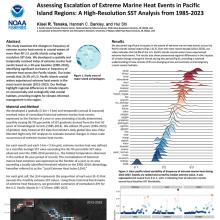Assessing the Escalation of Extreme Marine Heat Events in Pacific Island Regions: A High-Resolution SST Analysis from 1985-2023
Kisei
Tanaka
NOAA NMFS PIFSC
Poster
This study assesses changes in the frequency of extreme marine heat events in nearshore coastal waters using high-resolution SST data for more than 40 Pacific Island regions (PIR) surveyed by NOAA's National Coral Reef Monitoring (NCRMP) program. Utilizing a 30-year baseline from 1985 to 2014, we developed a spatially (5km × 5km) and temporally (monthly) resolved index of historical extreme marine heat events, expressed as a fraction of a year or area that exceeds the locally defined, monthly varying 96.7th percentile of historical SST gradients. We document significant increases in the extent of extreme marine heat events across the Pacific Islands coastal waters and compare these events to traditional coral reef climate stressors, such as those detected by NOAA Coral Reef Watch bleaching alerts and Degree Heating Weeks. Over the most recent decade (2014-2023), our index indicates that 24.3% of the U.S. Pacific Islands coastal waters have experienced extreme heat events. The results also show pronounced regional differences in the impacts of climate change among the islands during this period, providing a nuanced understanding of how climate shifts are diverging across economically and ecologically crucial coastal habitats. Our analytical framework allows for more contextualized comparison of the ongoing climate-driven transformations in coastal marine ecosystems. This provides climate/oceanographic context for long-term trends in coral reef ecosystem status and can assist with climate-informed management in the PIR.

Poster file
tanaka-kisei-poster.pdf
(738.05 KB)
